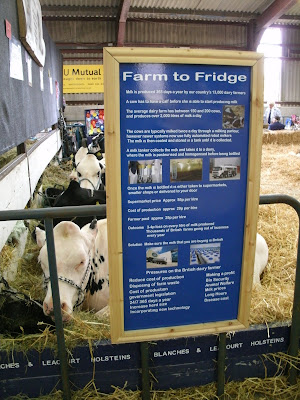
We have been lucky to live in a farming area for some 34 years now; it once was a farming community but then the supermarkets with their values of the bottom line and sourcing from the cheapest producers from any part of the world closed down many local small farmers and growers. Growers’ in the UK could not compete with, for example tomatoes grown in Africa where the cost of labour and production is low even though the cost of shipping, and the carbon footprint, is high. Our two village market gardens closed down as the majority of our counties grocers shops, unable to compete with the supermarkets closed. One of the market garden owners committed suicide.
The same supermarket pressure has been applied over the last few years to our milk producers, and many are going out of business on a weekly basis. When Pam and I were at the recent South of England Show I took this picture of a milk producer's stall. The most important words read;
Supermarket price approx 85p per litre
Cost of production approx 29p per litre
Farmer paid approx 25p per litre
Outcome 3-4p loss on every litre of milk produced. Thousands of British farms going out of business every year.
The supermarkets focus on buying at the cheapest price and then selling at the highest possible margin. Forget their claims of ‘giving you more’ or even ‘every little helps’ just look at their end of financial year profits to see where their focus really is.
What has happened to the UK farming industry is the equivalent of “selling the family silver”, when the time comes, and it will come soon, that we need the UK’s farmers they will no longer be there... then what?







